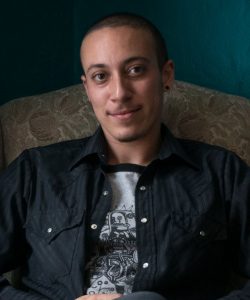Posted on 02/07/2018
Marcia Ochoa is Associate Professor and Chair of Feminist Studies at the University of California at Santa Cruz. An ethnographer of media, Ochoa’s work focuses on the role of the imaginary in the survival of queer and transgender people in Latin America, and the place of these subjects in the nation. Her first book, Queen for a Day: Transformistas, Misses, and the Performance of Femininity in Venezuela was published by Duke University Press in 2014 and nominated for a Lambda Literary Award in LGBTQ Studies. Ochoa is a founder and advisor to El/La Para TransLatinas, a social justice project for transgender Latina immigrants in the Mission District of San Francisco, CA and co-editor of GLQ: A Journal of Lesbian and Gay Studies.
Treva Ellison will share her work on “The Labor Werqin’ It: Ungender and Racial Capitalism.” This paper takes up unmasking as a mode of racialized gender panic that circumscribes the articulation of transgender subjects in print culture. She sits with an unmasking story of three gender non-conforming, Black femmes from a January 1950 issue of Los Angeles Herald-Examiner, to consider how unmasking, an aesthetic tactic of ungendering, works to reproduce and cohere a racialized space in Los Angeles. In short, her remarks consider what Black trans geographies have to tell us about the ways racial capitalism operates as an ungendering force.
Treva Ellison is an assistant professor in Geography and Women’s, Gender, and Sexuality Studies at Dartmouth College. Treva is currently working on a manuscript, tentatively titled Flex Zones, which historicizes queer criminality, queer grassroots activism, and counter-insurgent governance in Los Angeles.
 “Figuring Trans* Embodiments: Trace, Transfeminism, and Performance”
“Figuring Trans* Embodiments: Trace, Transfeminism, and Performance”
In this paper, Coleman begins developing a framework for naming transfeminist embodiment practices that figure trans* bodies. Citing the body archives of transgender performance artists from different parts of the Americas, he ask how certain trans* bodies perform and desire “un cuerpo incoherente” as feminist corporeal autonomy. Performatively suspending the scopic regime of legibility, how do marks, traces, and layers create an erotic ancestry of flesh?
Daniel Coleman Chávez is currently a Lecturer in Women’s and Gender Studies at UNC Greensboro. In addition to his teaching and scholarly work, Daniel is also a transfeminist organizer and transnational performance artist. His published work appears in journals and edited collections (in English and Spanish) including: Transgender Studies Quarterly, Liminalities: A Journal of Performance Studies, and in the second edition of Decolonial Pedagogies edited by Catherine Walsh. Daniel has taught and performed in México, Brazil, Colombia, Canada, Portugal, Spain, Poland, Germany, among other places. His solo work has been the subject matter of multiple MA theses and doctoral dissertations in the Americas and Europe and has been featured in exhibitions in the U.S., México, Brazil, and Guatemala.
When: Feb 07, 12:00 pm - 2:00 pm
Location: Kirkland Room, EUC